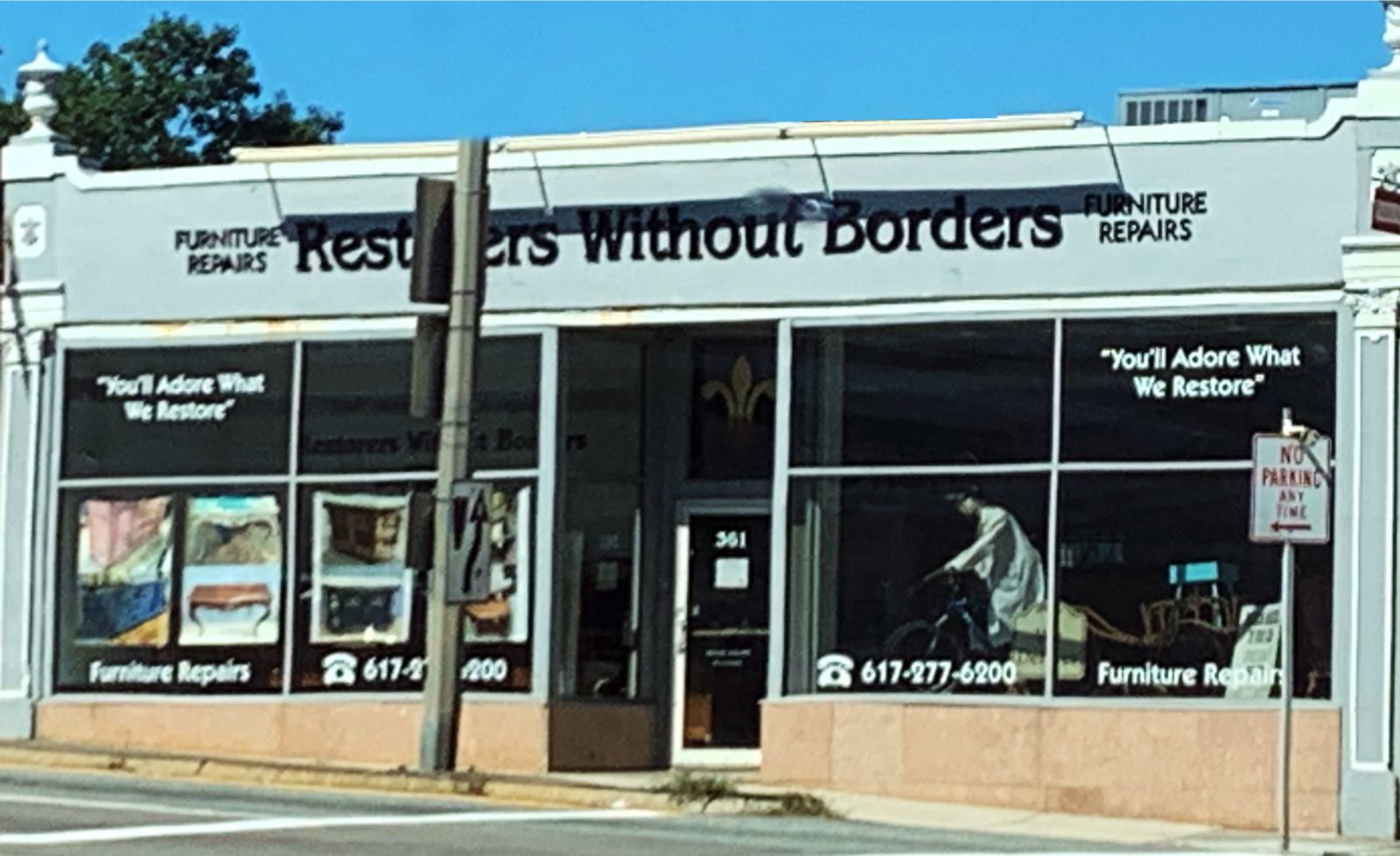| Ultimate Restoration
|
|
| Thursday, September 21, 2023 | |
At first glance, it cracked me up. Cruising the streets of Brookline, Massachusetts, we encountered a store named Restorers Without Borders. For a price, they take in furniture of all kinds and rebuild or refinish it. Cracked wood, missing table legs, scratched tabletops—they handle it all. And when they return that heirloom to you, it looks like new (or old, if you prefer). Not to be missed—their slogan. It's splashed on not one but two windows: "You'll adore what we restore." At first, I smiled. Then it struck me—isn’t that a perfect description of Jesus?
Everywhere He went, Jesus restored: people, relationships, dignity. He was a “restorer without borders,” as evidenced by His conversation with the Samaritan woman. Yet Christ's most profound restoration work was done as His nail-pierced body hung on the cross. There, He died to pay for our wrongdoing, our sins. In this self-denying act, He made it possible for every one of us to experience the ultimate restoration—peace with God. Have you asked Jesus to restore your soul by forgiving you of your sins and taking charge of your life? (He adores what He restores!) What’s stopping you?
|
|
| Don't Think He Will Hurt You
|
|
| Thursday, September 14, 2023 | |
Adrenaline rushed. My heart rate surged. I'd been walking alone on a country road, enjoying the early morning. And then I wasn't alone. A dog resembling a Doberman Pinscher turned the corner and headed right for me. With a cornfield on one side and a yard on the other, there was no place to go—and no stick to grab for self-defense. I was entirely exposed. Seconds later, the dog's owner rounded that same corner. "Nick!" She called out to her dog. But Nick blew her off and kept coming. "Nick, get over here!" This time, he paused, looked back at her, but kept walking toward me. I stopped, not wanting to upset the dog in any way. That’s when the lady shouted, “I don’t think he will hurt you.” I shot back, "It's the 'I-don't-think' part that bothers me!" Nick approached, sniffed my hand, and eventually, the not-too-obedient dog caught up with the lady who passed by with a smile—but no apology. Free of threatening dogs, I resumed my walk, pondering that this incident was an imperfect metaphor for the showdown that temptation brings. We can be minding our own business when around the corner—bam!—temptation shows up, headed right for us. But rather than a Doberman or Rottweiler, temptation is usually disguised as something cuddly and soft. Think Pomeranian or Bichon. If you linger, you'll invariably hear a voice calling, "I don't think it will hurt you." But it does. Every time. Then, having done its damage, temptation leaves you with a smile—and no apology. Oscar Wilde once famously quipped, “I can resist everything but temptation.” While it’s true temptation is inevitable, falling is not. The Bible assures us God will make a way of escape from every temptation we face. Let’s remember that!
|
|
| Wisdom in the Waves
|
|
| Thursday, September 07, 2023 | |
At Junkanoo Beach in the Bahamas, the turquoise ocean hue is so intense, you swear it’s been Photoshopped, and so clear you can see down at least 30 feet. What fun to zip my iPhone into a waterproof pouch and slip beneath the waves to capture images of underwater life. After years of watching Discovery Channel shows, it was intoxicating to experience it personally. Needing to come up for air, I wondered about shooting some different camera angles. What if I put that iPhone on the sand and clicked the shutter just as the waves collided? I scrunched my body down low and clicked away (onlookers concerned for my sanity?). After reviewing the pictures in our hotel room, I was intrigued to discover a bubbly look we don't usually "see." We tend to focus on the height of the surf or the curve of a wave. Or perhaps the splash of the impact on a rock. But the pictures on the phone showed a vast assortment of teeny bubbles—all frozen in an instant. It was a simple exercise—and I’m probably more intrigued with the results than anyone (who gawks at pictures of waves?) Yet I saw things that morning I had never noticed before. All because I lowered myself—and tried a different point of view. If only we could apply that lesson to the "problem people" in our lives. If you're like me, you find it easy to make assumptions and snap judgments about folks different from us: street beggars, homeless people, the perennially unemployed. It’s easy to pigeonhole them. But maybe to properly understand and genuinely love them, we need to lower ourselves and try a different point of view. Stop labeling them and start knowing them. Stop dissing them and start hearing them.
Lower yourself. And try a different point of view. Who knew there was wisdom in the waves?
|
|
| Come Boldly
|
|
| Thursday, August 31, 2023 | |
Are you bold when you pray? I'd not given the question much thought until recently. We were out at the camper—Saturday morning. It's breakfast time, which means six-year-old Ava is on one of my knees, and four-year-old Emma is on the other (our standard practice). I say a prayer of thanks for the meal that goes something like this: Dear Lord, Thank you for our food. You are so good to us. Thank you for letting us be together out here at the camper. It’s like a giant present. Before I can say Amen, Ava blurts out loudly, “And please help us to have a sleepover—tonight!" The last word is not spoken but sung in operatic style—complete with massive vibrato. As in "to-niiiiiiight!" (You’ve heard of photo-bombing—but I think we experienced a prayer-bombing!) In my estimation, that qualifies as bold praying. Ava really wanted a sleepover—that night—at our camper. And she wasn’t the least bit shy about asking God. Of course, asking in our hearing might have greased the skids just a bit in her favor. And, of course, we did have a sleepover. But the more you read Scripture, the less bombastic Ava's prayer seems. In fact, the Bible commends her style. We’re invited—no, commanded—to approach God with boldness. Do you? Don’t hold back. Don’t be wimpy. Next time, pray boldly. Like Ava.
|
|
| Who--me? Repent?
|
|
| Thursday, August 24, 2023 | |
Like many workplaces, Moody has a wellness program that encourages employees to pursue a healthier lifestyle. You watch educational videos, do fitness exercises, and take a healthy eating lifestyle class—that sort of thing. For every course you take, you get points. When you earn enough points, you earn the reward: $20/month off the cost of your insurance. But here’s the thing. This is really about repentance!
Can I be brutally honest with you? (Don't tell anyone, but) I just want the points—the discount! So, I do the bare minimum. And—sad to say—none of the courses have substantially changed my lifestyle. I watch the videos—the “sermons” on wellness—but none of it changes me. Because all I want is the prize. Which takes me to a brutal question. Do we follow Jesus only for the prize—the payoff? Do we love Him primarily because of the gifts and bonuses He offers? Or do we love Him because we love Him? Just because He is worthy. Here’s the litmus test: Are you repenting—turning away from sin? Little repentance equals little love. Much repentance equals much love.
|
|
| Records per page First Prev 3 4 5 6 7 8 9 10 11 12 of 126 Next Last | |
 Jon Gauger Jon Gauger |
|||||||||||||||
| Thursday Thought | |||||||||||||||
|
|
|||||||||||||||
Recent Posts
|




